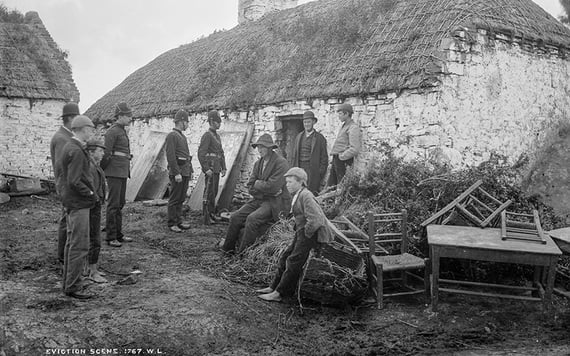Evicting an elderly family of two brothers and one sister just weeks before Christmas, and using a Northern Irish security firm to do so, was a recipe for disaster given the history of evictions in rural Ireland.
That is what happened last week when the European owned bank KBC used hired heavies to toss the family to the side of the road near Strokestown in Co. Roscommon, ironically site of a major Famine museum.
Luckily, one local activist filmed the dreadful proceedings made even stranger by the nearby presence of the gardai who stated they had no grounds to intervene. The eviction enraged the quiet Roscommon locality and rightly so.
Read more: The former British soldier behind the shocking Roscommon eviction
The ordinary people of Ireland know their banking system almost collapsed because of greed and corruption and duly noted that the banks were all bailed out by the Irish taxpayer, and very few of the rich and greedy perpetrators of the worst financial meltdown in history were sent to jail.

KBC bank's Dublin headquaters.
Not so for the plain folks at the other end of the funnel who suddenly saw their loans recalled and no further financing allowed as the banks cut lending back to the bone.
Hard times came, and thousands of Irish homes were foreclosed or sold off to vulture funds to dispose of. They acted without mercy.
Thus, evictions have followed, mostly quietly, but the video account of what happened to the rural Roscommon family incensed their neighbors and much of Ireland.
Read more: Rural Ireland ablaze after eviction by KBC bank of three elderly siblings
The specter of the Famine evictions still lurks in rural Ireland itself, utterly shaped by that period. That spectral flame was relit at the sight of hired British bailiffs throwing a family out even 180 years later.
The Roscommon eviction even featured a return to the day of the Ribbonmen, the group during Famine times who tried to defend the defenseless peasants and destroyed crops and animals owned by the landlords.

Scenes of evictions from Irish homes in the late 1800s / early 1900s.
A group of modern-day Ribbonmen showed up at the remote farmhouse where the family had been evicted from and gave a thorough hiding to the heavies and set fire to their trucks.
Their actions, as expected, were widely condemned by the powers-that-be, but the plain folk in every county applauded them for their actions.
Scratch the surface in Ireland and you will find that strain of resistance to evictions no matter to whom, where or when.
Modern-day evictions are a ghostly reminder of a horrible period of a dim and distant past often recounted to children by parents and grandparents and very much alive in the folk memory.

Scenes at the Roscommon home after the public took on eight security guards set to monitor the property after the sibling's eviction.
Millions of Irish Americans too, know they owe their existence in America to those long-ago evictions that forced hundreds of thousands on to the migrant trail.
KBC Bank Ireland showed no sense of understanding of that history or background when they hired thugs to evict an elderly threesome just before Christmas.
It is their folly. Irrespective of what happens the property will never be sold, the code of the country being well known that to take over an evicted family's home is as bad as evicting them firstly.
The standoff in Strokestown is a timely reminder that eviction issues still haunt rural Ireland, and the fallout from the demise of the Celtic Tiger can still be felt. The entire issue of evictions and how they are enforced needs to be re-examined urgently.
Read more: Roscommon siblings back home, “traumatized” after violent eviction




Comments